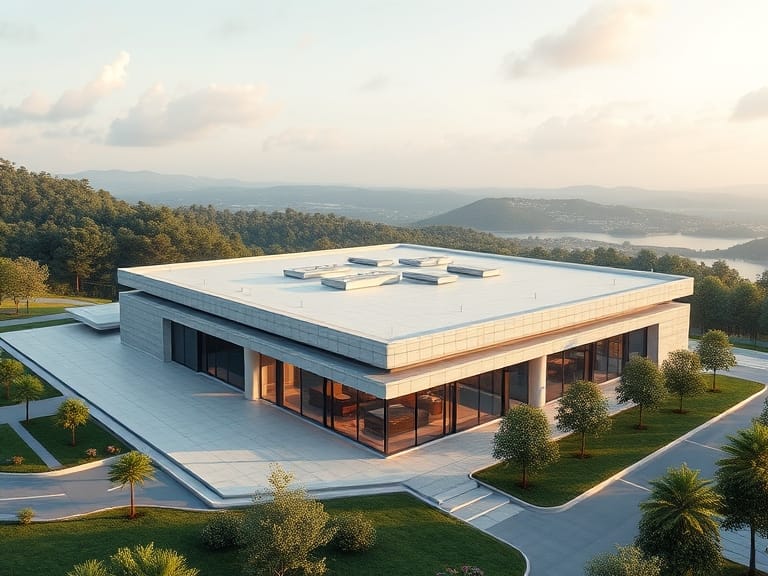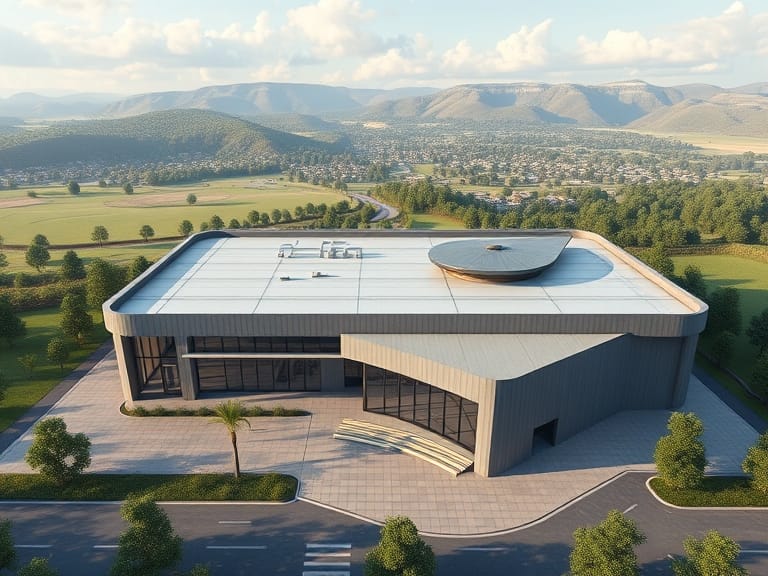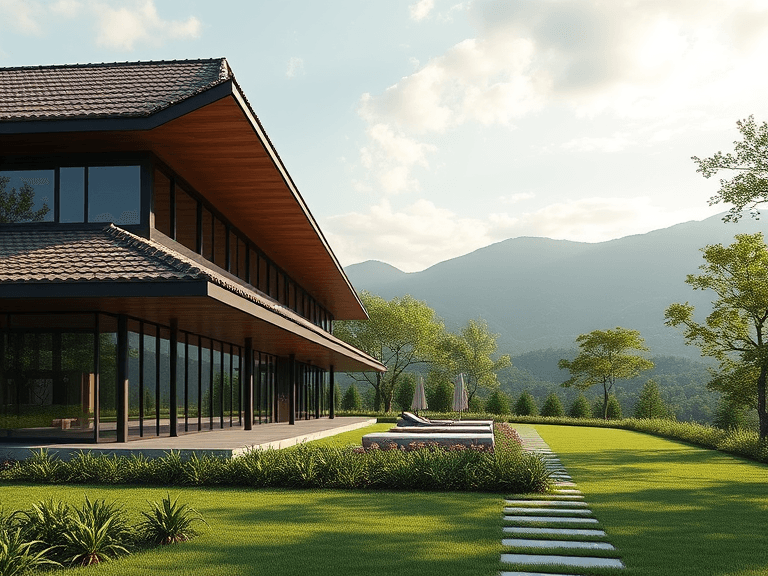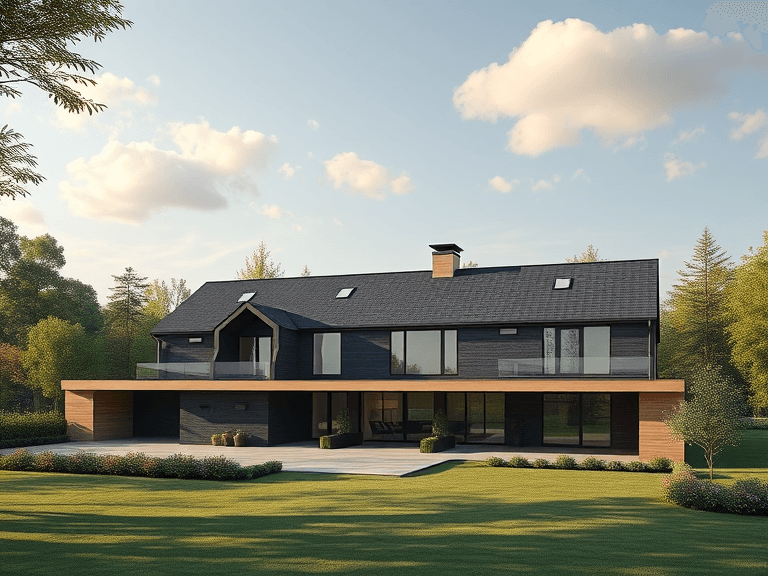
Commercial flat roofing is a widely adopted construction technique utilized predominantly in commercial buildings, characterized by its minimal slope or nearly level structure. Unlike traditional pitched roofs that feature a distinct incline, flat roofs are designed to facilitate efficient rainwater drainage and enhance the functionality of the building’s upper space. This unique attribute not only distinguishes flat roofing from pitched options but also significantly affects the choice of materials and design considerations in the construction process.
Typically, commercial flat roofs are constructed using a variety of materials, each offering specific benefits. Membrane roofing systems, which include options like TPO (thermoplastic polyolefin), EPDM (ethylene propylene diene monomer), and PVC (polyvinyl chloride), are popular for their durability, flexibility, and energy efficiency. Additionally, built-up roofing (BUR) systems involve a layered composition of asphalt and roofing felt, providing robust protection and heightened longevity. These materials are specifically selected based on their ability to withstand the elements and contribute to overall energy savings.
The advantages of choosing the best commercial flat roofing in Toronto are manifold. One notable benefit is the ease of HVAC installations and other mechanical units, as these systems can be mounted directly on the flat surface without complications associated with pitched roofs. Furthermore, the level design demonstrates a greater potential for maximizing usable space, allowing for rooftop gardens, solar panel installations, and additional storage options. Businesses also appreciate the cost-effectiveness of flat roofing systems due to their lower installation and maintenance costs compared to pitched roofs. Ultimately, understanding the fundamental aspects of commercial flat roofing plays a pivotal role in making informed decisions that align with both functional and aesthetic objectives for commercial properties.
Factors to Consider When Choosing Flat Roofing
Selecting the appropriate flat roofing for commercial buildings in Toronto requires a comprehensive understanding of various critical factors. The unique climate of Toronto plays a vital role in this decision-making process. This city experiences a wide range of weather conditions, including heavy snowfall during winter and humidity during summer. Therefore, a roofing option that can withstand both extreme temperatures and significant moisture is essential. Materials such as EPDM, TPO, or modified bitumen are often recommended due to their resilience and adaptability to these conditions.
Furthermore, one must consider the local building codes and regulations that govern roofing installations in Toronto. Compliance with these rules ensures safety and longevity for the structure. These regulations can dictate material types, insulation requirements, and proper drainage systems, which are all crucial to prevent potential damage over time.
Another pivotal aspect is the roof’s lifespan. Choosing materials known for their durability will result in reduced replacement frequency, thus lessening long-term costs. Investing in high-quality roofing can also enhance the overall value of the property. Additionally, energy efficiency cannot be overlooked, especially in an urban setting where buildings contribute to the heat island effect. Options with reflective coatings can significantly decrease cooling costs, making them an attractive choice.
Maintenance requirements should also be factored into the decision. A roofing system that demands less upkeep can save both time and money in the long run. Therefore, assessing the maintenance expectations of various roofing types will help you make a well-informed choice. Finally, budget constraints are inevitable in any commercial project. It is essential to strike a balance between quality and affordability while pursuing the best commercial flat roofing in Toronto. By carefully evaluating these factors, property owners can ensure they opt for a roofing solution that meets their needs and objectives effectively.
Types of Flat Roofing Materials
Flat roofing has become increasingly popular for commercial buildings in Toronto due to its efficiency and versatility. Within this category, a variety of materials are available, each with distinct properties, advantages, and disadvantages. Understanding these options is crucial for making informed decisions when choosing the best commercial flat roofing in Toronto.
One widely used material is Thermoplastic Polyolefin (TPO). TPO is known for its reflective surface, which helps improve energy efficiency by reducing cooling costs. It is lightweight and easy to install; however, it can be prone to punctures and may require frequent maintenance. TPO is ideal for commercial buildings that prioritize energy savings and have moderately to heavily trafficked rooftops.
Another popular option is Polyvinyl Chloride (PVC). Similar to TPO, PVC offers excellent reflectivity and energy efficiency. It is durable, resistant to chemicals, and has a long lifespan. Nevertheless, its initial installation costs might be higher than those of other materials. PVC is best suited for buildings requiring strong performance in a variety of environmental conditions.
Ethylene Propylene Diene Monomer (EPDM) is also a prominent choice in the flat roofing market. This rubber membrane material is well-regarded for its exceptional durability and longevity. EPDM is resistant to UV radiation and adverse weather conditions. However, it is less energy-efficient than TPO and PVC, as it typically comes in darker colors. EPDM is an excellent option for buildings with less foot traffic and those that experience extreme weather.
Lastly, modified bitumen provides a traditional alternative with a proven track record. It combines asphalt with modifiers to improve performance. This material is versatile and can withstand rough weather, but it is heavier than other options. Modified bitumen is suitable for buildings that require a more conventional roofing system and have specific installation needs.
Evaluating Roofing Contractors in Toronto
When embarking on a commercial flat roofing project, one of the most crucial steps is the selection of a reliable roofing contractor in Toronto. The quality of workmanship and materials can significantly impact the longevity and performance of a flat roof. Therefore, thorough evaluation of potential contractors is essential. Start by researching credentials, as reputable contractors should have proper licensing and certifications that align with Toronto’s building codes. This not only indicates their legitimacy but also their understanding of local regulations that are critical for flat roofing.
Next, it is imperative to check references. A quality roofing contractor should be willing to provide a list of past clients. Contacting these references allows you to gauge their satisfaction with the contractor’s service, timeliness, and reliability. Additionally, observing completed projects can give insight into the contractor’s skill level and attention to detail, crucial factors when choosing the best commercial flat roofing in Toronto.
Understanding insurance and warranty options is another key aspect of evaluating roofing contractors. It is essential that the contractor carries liability insurance to protect against accidents or damage that may occur during the project. Furthermore, inquire about warranties on both materials and workmanship. A robust warranty is an indicator of the contractor’s confidence in their work and can provide peace of mind to property owners.
Lastly, prioritize contractors with relevant certifications and affiliations with professional associations. These credentials ensure that the contractor stays updated with the latest roofing technologies and industry best practices. In conclusion, a careful evaluation of roofing contractors, focusing on credentials, references, insurance, warranties, and certifications, is essential in the pursuit of selecting the best commercial flat roofing in Toronto for your project, ensuring a reliable and durable outcome.
Cost Considerations for Flat Roofing
When embarking on a project involving commercial flat roofing in Toronto, it is essential to understand the various cost components associated with the installation and maintenance of such a roofing system. The costs generally derive from several factors, including materials, labor, and potential additional expenses such as permits and inspections. By evaluating these elements, property owners can make more informed financial decisions, leading to effective project budgeting.
Materials represent one of the most significant costs in commercial flat roofing. The choice of roofing material plays a pivotal role in determining overall expenses. Common options include built-up roofing, modified bitumen, and single-ply membranes, each varying in price, durability, and maintenance requirements. For instance, while single-ply membranes typically have a higher upfront cost, they may offer better long-term performance and lower maintenance fees, potentially making them more cost-effective over time.
Labor costs also contribute significantly to the total expenditure. Generally, labor rates in Toronto may vary based on the complexity of the roofing system and the contractor’s experience. Engaging a reputable contractor will ensure that the installation adheres to local building codes and regulations, which often require that specific permits are obtained. Additional costs incurred for permits and inspections should be anticipated, as they are critical for compliance with municipal regulations.
To achieve optimal cost savings, it is advisable to obtain multiple quotes from different contractors. This practice not only helps in comparing prices but also allows property owners to gauge the level of service and expertise offered. Finally, financing options may also be available for those who wish to spread the costs over time, thus easing the burden of upfront payments associated with choosing the best commercial flat roofing in Toronto.

Maintenance Tips for Flat Roofing
Maintaining a commercial flat roofing system is critical to ensure its longevity and optimal performance. Regular maintenance routines help identify potential problems early, thus extending the roof’s lifespan and minimizing repair costs. One of the first steps in effective maintenance is to perform routine inspections. Ideally, these should occur seasonally, particularly after severe weather events, to assess any damage caused by elements such as heavy rain or snow. During these inspections, check for visible signs of wear and tear, such as cracks, blisters, or bubbles in the roofing membrane.
Another crucial aspect of flat roof maintenance is cleaning debris. Accumulated leaves, dirt, and other materials can lead to various issues, including mold growth and water pooling. Ensuring that the roof’s surface is clear allows for proper drainage, which is especially important for flat roofing systems that are prone to water retention. Make it a point to remove debris regularly, particularly after storms or strong winds, as this can prevent more significant issues down the line.
Protecting the roof against water pooling is essential. Flat roofs are designed to have a slight slope, allowing water to drain off effectively. However, if pooling occurs, it can lead to leaks and structural problems. Ensure that drains, scuppers, and gutters are not blocked and are functioning correctly to facilitate proper water movement.
Lastly, scheduling professional maintenance is advisable for commercial flat roofs in Toronto. Professional contractors can offer services such as sealing seams, checking flashing integrity, and applying protective coatings that increase durability. Regular professional check-ups complement routine home inspections, providing comprehensive care for your roof.
Weather Impact on Flat Roofing in Toronto
The climate in Toronto is characterized by distinct seasonal changes that significantly affect the performance and durability of flat roofing systems. Particularly for commercial flat roofing, understanding these weather influences is crucial in making informed decisions regarding installation and maintenance. One of the primary concerns during winter is the heavy snow loads that flat roofs must bear. Failure to account for these loads can lead to structural failures and costly damage, highlighting the importance of selecting robust roofing materials that can withstand the pressures exerted by accumulated snow.
Summer also poses challenges for commercial flat roofing in Toronto. The city experiences considerable heat, which can exacerbate the wear and tear on roofing materials. High temperatures can lead to thermal expansion, causing materials to warp or degrade over time. Effective insulation and heat-resistant materials become essential in mitigating these effects, prolonging the roofing system’s lifespan. Coupled with this, Toronto’s humid summers can lead to moisture retention, making proper drainage systems critical to prevent standing water that could hasten deterioration.
Additionally, the potential for ice dam formation during the transitional seasons, particularly from fall to winter, must not be overlooked. Ice dams can create pockets of water that may infiltrate the roofing system, leading to leaks and water damage within the building. To combat this, a well-planned waterproofing strategy becomes vital, especially in cold temperatures when the risks of ice accumulation are high. By investing in quality roofing solutions and ensuring diligent maintenance, commercial property owners can effectively navigate the various weather-related challenges associated with choosing the best commercial flat roofing in Toronto, ensuring both longevity and safety for their buildings.
Sustainable Flat Roofing Options
In the realm of commercial flat roofing in Toronto, sustainability has become an increasingly important consideration for property owners and managers. Sustainable flat roofing options not only contribute positively to the environment but also offer significant benefits in terms of energy savings and overall building performance. Two prominent sustainable roofing strategies are green roofs and cool roofing systems, both of which have garnered attention for their efficacy and advantages.
Green roofs involve the installation of vegetation on a flat roof, creating a living ecosystem that can absorb carbon dioxide and provide natural insulation for the building. This method of roofing facilitates stormwater management by reducing runoff, which is especially crucial in urban environments, where water drainage systems can become overwhelmed. Moreover, the added layer of soil and plants can enhance energy efficiency by decreasing heat absorption during summer months, leading to lower cooling costs.
On the other hand, cool roofing systems are designed to reflect more sunlight and absorb less heat than standard roofing options. These roofs typically employ highly reflective materials or coatings that can significantly lower rooftop temperatures, reducing the need for air conditioning and thereby decreasing energy consumption. Such systems can be particularly beneficial during Toronto’s hot summer months, resulting in better indoor comfort and lower utility bills.
In addition to these environmental benefits, choosing sustainable flat roofing options can often lead to potential tax incentives at the municipal or provincial level, making them a financially wise choice. Property owners can enjoy long-term cost savings and contribute positively to the urban landscape by selecting the best commercial flat roofing in Toronto that aligns with their sustainability goals. Engaging with professionals who specialize in sustainable solutions can help leverage these benefits fully and ensure the roof meets both performance and environmental standards.
Conclusion and Final Thoughts
Choosing the best commercial flat roofing in Toronto is a significant decision that can impact the longevity and performance of a commercial property. Throughout this blog, we explored the various aspects that contribute to making an informed choice regarding flat roofing systems. From understanding different roofing materials, such as EPDM, TPO, and PVC, to evaluating installation procedures and cost considerations, it is essential to approach this decision with diligence and care.
One of the critical points emphasized is the importance of proper research. By investigating the specific characteristics and benefits of each material type, property owners can align their roofing needs with suitable options. Moreover, considering environmental factors, such as weather conditions in Toronto, can influence the productivity and durability of flat roofing solutions. It is also vital to review warranties and lifecycle costs, ensuring that the investment made offers long-term value.
Consultation with roofing professionals remains essential in the decision-making process. Experienced contractors can provide valuable insights into the most appropriate materials and installation practices based on the unique demands of a commercial property. Engaging with experts allows for tailored recommendations and helps mitigate potential issues arising from improper installation or material selection.
In light of the information presented, we encourage property owners and managers to carefully weigh their options when it comes to choosing the best commercial flat roofing in Toronto. A well-informed approach not only ensures effective roofing solutions but also enhances the overall safety and functionality of the building. Ultimately, making educated choices concerning flat roofing can greatly influence the operational integrity of a commercial establishment for years to come.


